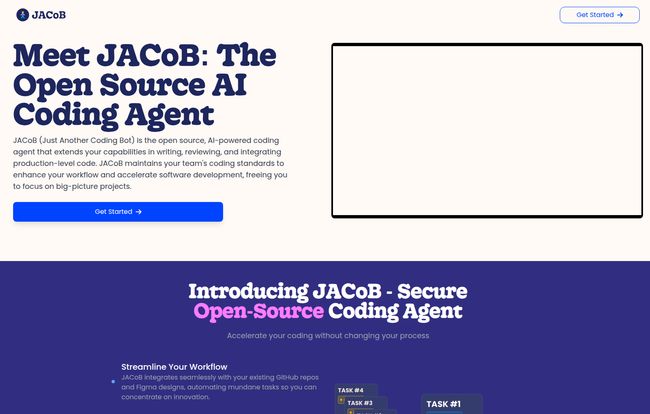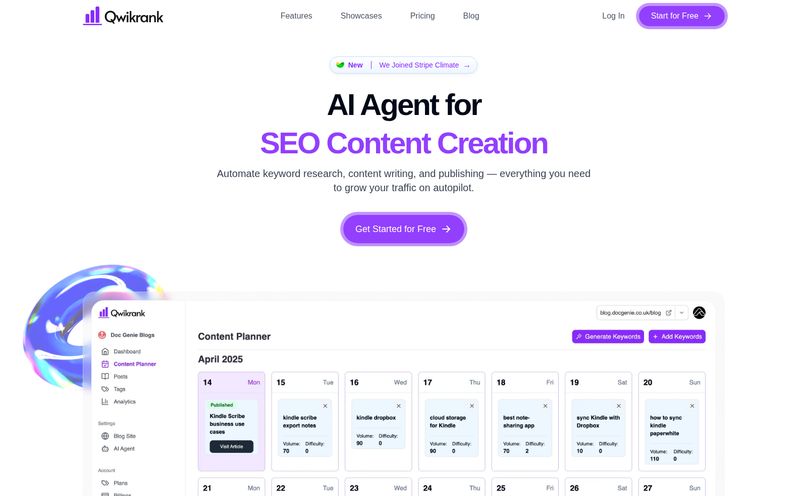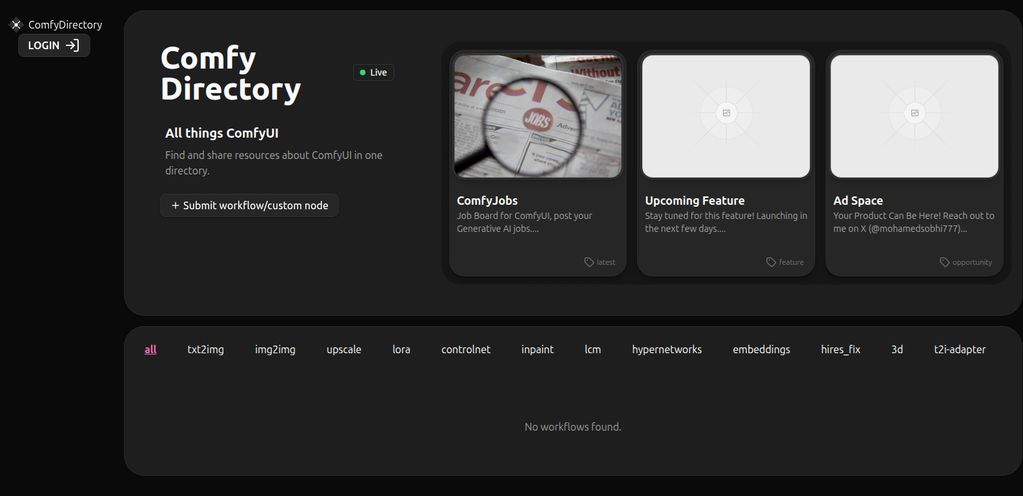We all got into development to build cool stuff, solve interesting problems, and maybe, just maybe, feel a little bit like a wizard. But what does a huge chunk of our day actually look like? Writing boilerplate, hunting down that one rogue CSS property from a Figma file, and sitting in endless pull request review cycles. It's the necessary grind, the plumbing work that has to get done before the magic can happen.
For the last couple of years, AI coding assistants like GitHub Copilot have felt like a step in the right direction. They’re great for autocompleting a function or spitting out a quick snippet. But I’ve always felt they’re more like a super-powered autocomplete than a true collaborator. They don't really get the bigger picture.
Well, I recently stumbled upon a new player that’s taking a totally different approach. It’s called JACoB, and it’s not an “assistant.” It’s an agent. And that distinction, my friends, makes all the difference.
What Exactly is JACoB? (And Why Should I Care?)
So, what’s the big deal? JACoB bills itself as a “secure and private open source AI-powered coding agent.” That's a mouthful, I know. Let's break it down. Instead of just suggesting the next line of code, JACoB is designed to handle entire tasks, end-to-end. Think of it less like a backseat driver whispering suggestions and more like a dedicated junior dev you can assign a task to. A junior dev who needs no sleep, never complains about grunt work, and learns your team's coding style frighteningly fast.
The core idea is to automate the mundane stuff so you can focus on innovation. It integrates with your existing GitHub repos and, get this, your Figma designs. It can literally look at a design, understand it, and generate the code for it. That alone made my ears perk up.
It works by mapping your entire codebase, learning its patterns, quirks, and standards. This means the code it generates isn't some generic, out-of-the-box solution; its tailored to look and feel like it was written by someone on your team.

Visit JACoB
The Features That Actually Matter
Okay, marketing hype is one thing, but what can it actually do? I’ve seen a lot of AI tools promise the world, but JACoB’s feature set seems grounded in solving real-world developer headaches.
From Figma Mockup to Functional Code
This is the one that gets me most excited. The gap between design and development is where so much time is lost. A designer perfects a component in Figma, and then a developer has to painstakingly translate every margin, font-size, and color into code. JACoB aims to bridge that gap by directly interpreting Figma designs and creating a pull request. If it works as advertised, this could be a monumental time-saver. No more “is that 16 or 18 pixels of padding?”
A Code Reviewer That Never Sleeps
Code reviews are critical, but they can also be a bottleneck. Senior devs spend hours checking for bugs, security flaws, and style guide violations. JACoB automates a huge part of this. It intelligently reviews code changes, proactively flagging potential issues. This doesn't replace human oversight—you still need a human to check the logic—but it cleans up the low-hanging fruit. It means fewer comments about trailing whitespace and more focus on the actual architecture. It’s like having a hyper-vigilant linter that also understands security and performance.
It Actually Understands Your Entire Project
This is JACoB’s secret sauce. Most AI assistants only see the file you're currently in. They have no idea if the function you're writing will clash with something in another module. JACoB, on the other hand, creates a map of the entire codebase. This full-context view allows it to generate code that's consistent, maintainable, and aware of the project’s architecture. It’s the difference between memorizing a sentence and understanding the whole book.
Open Source: The Real Game-Changer
Here’s the part that will make security and DevOps teams breathe a sigh of relief: JACoB is open source. Why is this so important? Two big reasons.
First, security and privacy. With many cloud-based AI tools, you’re essentially sending your proprietary code to a third-party server. For many companies, that’s a non-starter. Since JACoB is open source, you can host it yourself. Your code never leaves your infrastructure. You control the keys to the kingdom. Period.
Second, customization. Every team has its own unique workflow and coding standards. With a closed-source tool, you're stuck with what they give you. With JACoB, you can get under the hood and tweak it to fit your exact needs. You can teach it your specific patterns and integrate it deeply into your CI/CD pipeline. This level of control is something you just can’t get with off-the-shelf products.
Okay, But What’s the Catch? A Realistic Look
Alright, it sounds great, but nothing is perfect. Based on the docs and the nature of this kind of tool, there are a few trade-offs to consider. This isn't a magic wand.
- The Setup: This isn't a one-click browser extension you install in 30 seconds. Being a powerful, self-hosted agent means there's an initial configuration process. You’ll need to get it set up and integrated with your systems. It’s a professional tool that requires a professional setup.
- The Learning Curve: You and your team will need to learn how to work with JACoB effectively. This means learning how to phrase your requests and how to best leverage its capabilities. It's a new way of working, and that always comes with a little adjustment period.
- Performance: The old saying “garbage in, garbage out” applies here. JACoB's performance will depend on the quality of your existing codebase. If your code is a tangled mess, the AI will have a harder time making sense of it. In a way, though, this is a good thing—it encourages you to maintain a cleaner, more consistent codebase.
How Does JACoB Compare to GitHub Copilot?
It's the natural question, right? Here’s how I see it. It’s not about which one is “better,” but which one fits your needs. They’re different tools for different jobs.
| Aspect | JACoB | GitHub Copilot |
|---|---|---|
| Type | AI Agent (Proactive) | AI Assistant (Reactive) |
| Context | Full codebase | Current file / open tabs |
| Model | Open Source & Self-hostable | Proprietary & Cloud-based |
| Core Use | Automating end-to-end tasks (e.g., Figma to PR) | Code completion and snippet generation |
Copilot is fantastic for speeding up your typing and handling small, in-the-moment coding tasks. JACoB is aimed at automating entire chunks of the workflow. One is a power tool, the other is an assembly line robot.
The Big Question: What About Pricing?
Here’s the best part. Because JACoB is an open-source project, the software itself is free. You can go to its code repository right now, download it, and run it. Of course, “free” doesn’t mean zero cost. You'll need to account for the potential cost of self-hosting it on a server, and the time investment for setup and maintenance. It's common for open-source projects like this to eventually offer paid enterprise support or a managed cloud version for convenience, but the core tool remains free to use and modify. For many teams, this is a far more attractive model than a per-seat, per-month subscription fee.
Frequently Asked Questions about JACoB
Is JACoB secure for enterprise use?
Yes, its security is one of its main selling points. Because it's open-source and can be self-hosted, your code and data never have to leave your own secure infrastructure, giving you full control.
Will AI agents like JACoB replace developers?
Not a chance. It’s a tool designed to augment developers, not replace them. It handles the repetitive, tedious work, which frees up human developers to focus on what they do best: creative problem-solving, system architecture, and building innovative features.
What coding languages does JACoB support?
Since it learns from your codebase, it's designed to be adaptable. While most AI tools have strong support for popular languages like JavaScript, Python, and Java, JACoB’s ability to map an entire project suggests it can learn the patterns of any language present in your repository.
Do I need to be a DevOps expert to set it up?
You'll likely need some comfort with the command line and server configuration. It's not a plug-and-play app. However, open-source projects usually come with documentation to guide you, and the community can be a great resource for help.
Is this just another wrapper around ChatGPT?
No. While it uses large language models, its value comes from its agent-like framework. It's not just a chat interface. Its deep integration with GitHub, Figma, and its full-codebase awareness make it a fundamentally different and more specialized tool.
Final Thoughts
Look, the wave of AI in software development is not just coming; it’s already here. But I believe the most impactful tools won't be the ones that just make us type faster. They'll be the ones that fundamentally change our workflows for the better.
JACoB feels like a step in that direction. By operating as a customizable, private, and context-aware agent, it tackles some of the most time-consuming parts of the development lifecycle. It's an ambitious project, and it might not be for every solo dev working on a small project. But for teams that are serious about efficiency, code quality, and security, JACoB is definitely one to watch. It might just be the new best friend your team has been waiting for.
Reference and Sources
- JACoB Official Website: Information and project details were sourced from the official JACoB platform page.
- Open Source Philosophy: General principles of open-source benefits are widely discussed in communities like the Open Source Initiative.
- Developer Tool Integrations: The importance of toolchain integration is a constant topic in developer communities and platforms like GitHub and Figma.



